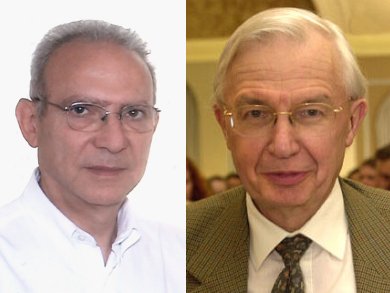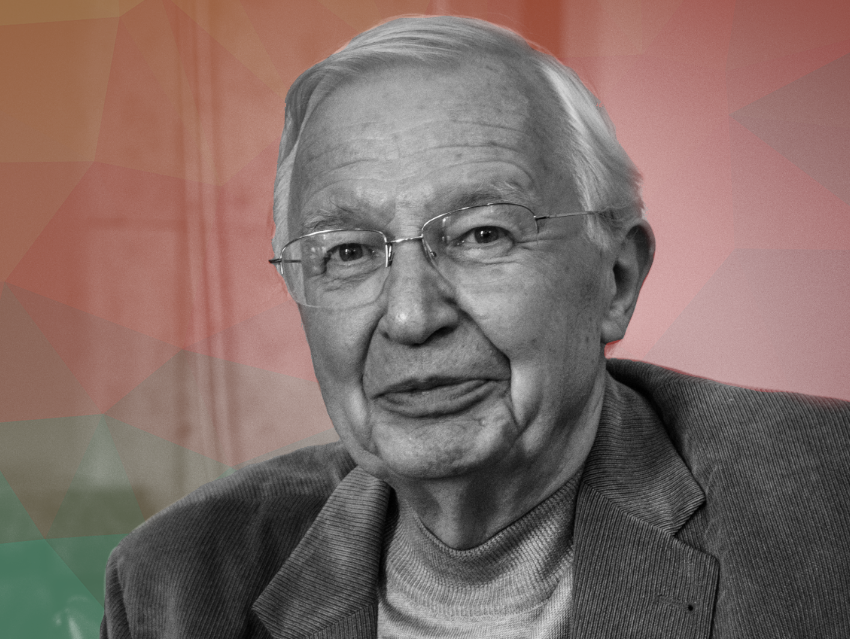Professor Jean-Marie Lehn, University of Strasbourg, France, has been awarded the Primo Levi Prize by the Gesellschaft Deutscher Chemiker (GDCh, German Chemical Society), the Italian Chemical Society (Società Chimica Italiana, SCI), and the and the Centro Internazionale di Studi Primo Levi. The prize is named after the Italian Jewish chemist, writer, and Holocaust survivor Primo Levi and honors chemists or scientists from related disciplines who are particularly committed to protecting human rights and advancing the dialogue between chemistry and society. This is the fourth time the prize has been awarded; previous recipients are Roald Hoffmann (USA), Vincenzo Balzani (Italy), and Henning Hopf (Germany).
The award was presented at the Sala Zuccari of the Italian Senate in Rome, Italy, on December 4, 2025. The laudatio was held by Professor Gianluca Farinola, President of the Italian Chemical Society. The ceremony was attended by Renzo Levi, the son of Primo Levi.
Commitment to Chemistry and Society
Jean-Marie Lehn receives the award “in recognition of his remarkable impact as an ambassador of science, dedicated to uniting people through scientific excellence, international cooperation, and the ethical advancement of knowledge. His legacy encompasses groundbreaking discoveries and a profound commitment to fostering unity, understanding, and cooperation across borders.”
Jean-Marie Lehn has consistently demonstrated the power of science as a pivotal force in promoting European scientific cohesion and transnational cooperation in the post–Cold War era. He played a crucial role in overcoming historical divisions, contributing significantly to the harmonization of chemical research and education across the continent. Without his initiative, the joint European publishing endeavour known today as Chemistry Europe—launched with the first common publication, Chemistry – A European Journal—might never have come into existence.
Through his leadership role at the International Organization for Chemical Sciences in Development (IOCD), Professor Lehn has also advanced the chemical sciences for sustainable development, particularly in developing countries. His core belief—namely, that “Science is a vector of peace, development, and progress. It is universal. It should be shared universally”—perfectly aligns with the ethical legacy of Primo Levi and underscores Professor Lehn’s commitment to human values and scientific integrity, making him especially deserving of this award.
Professor Lehn’s excellence in fostering international cooperation, interdisciplinary dialogue, and ethical research demonstrates a profound commitment to human rights and scientific integrity, fully meriting this prestigious recognition.
Career
Jean-Marie Lehn, born on September 30, 1939, in Rosheim, France, studied chemistry at the University of Strasbourg and received his Ph.D. in organic chemistry in 1963 under the supervision of Guy Ourisson. He then performed postdoctoral research with Robert Burns Woodward at Harvard University, Cambridge, MA, USA, where he took part in the total synthesis of Vitamin B12. In 1966, Jean-Marie Lehn was appointed as maître de conférences (Assistant Professor) at the Chemistry Department of the University of Strasbourg. In 1980, he became Chair of Chemistry of Molecular Interactions at the Collége de France in Paris.
Jean-Marie Lehn is a pioneer of supramolecular chemistry, which—instead of studying the bonds inside one molecule—looks at intermolecular interactions and molecular assemblies. Lehn received the Nobel Prize in Chemistry in 1987 together with Donald J. Cram and Charles J. Pedersen for their work on the “development and use of molecules with structure-specific interactions of high selectivity”. Lehn specifically was honored for his development of cryptands, three-dimensional multidentate ligands.
Besides the Nobel Prize and among many other honors, Jean-Marie Lehn has received the Gold Medal of the Centre National de la Recherche Scientifique (CNRS) in 1981, the Karl Ziegler Prize from the Gesellschaft Deutscher Chemiker (GDCh, German Chemical Society) in 1989, the Davy Medal of the Royal Society and the Lavoisier Medal of the Société Française de Chimie (SCF, French Chemical Society) in 1997, and the Gold Medal “Giulio Natta” from the Società Chimica Italiana (SCI, Italian Chemical Society) in 2003, as well as many honorary doctorates and honorary memberships and fellowships in dozens of learned societies. He was Co-Founder of Chemistry – A European Journal and is a Chemistry Europe Honorary Fellow.
Selected Publications
- Shunyu Xiang, Jing Wang, Yang Shen, Xingyi Luo, Xiaoyan Wang, Changyun Liu, Xinyu Chen, Hüseyin Enis Karahan, Jin Huang, Alberto Bianco, Xianchao Sun, Manganese-Enhanced Nanopesticides Augment Plant Resistance against Viral Infection via an Untapped Macroautophagy Pathway, Advanced Functional Materials 2025. https://doi.org/10.1002/adfm.202500538
- Ferran Esteve, Zhaozheng Yang, Jean-Marie Lehn, Emerging Complex Behavior Driven by Self-Organization: Dynamic Covalent Libraries of Acylhydrazones in Water, J. Am. Chem. Soc. 2025, 147, 31, 28408–28418. https://doi.org/10.1021/jacs.5c09521
- Sapna Gahlot, Jean-Louis Schmitt, Aline Chevalier, Marco Villa, Myriam Roy, Paola Ceroni, Jean-Marie Lehn, Marc Gingras, “The Sulfur Dance” Around Arenes and Heteroarenes – the Reversible Nature of Nucleophilic Aromatic Substitutions, Chem. Eur. J. 2024. https://doi.org/10.1002/chem.202400231
- Zhaozheng Yang, Ferran Esteve, Cyril Antheaume, Jean-Marie Lehn, Triply Adaptive Libraries of Dynamic Covalent Macrocycles: Switching between Sorted and Unsorted States, J. Am. Chem. Soc. 2024, 146(22), 15438–15445. https://doi.org/10.1021/jacs.4c03698
- Ferran Esteve, Tanguy Rieu, Jean-Marie Lehn, Key structural features to favour imines over hydrates in water: pyridoxal phosphate as a muse,
Chem. Sci. 2024. https://doi.org/10.1039/D4SC02206H - Jean-François Lutz, Jean-Marie Lehn, E. W. Meijer, Krzysztof Matyjaszewski, From precision polymers to complex materials and systems, Nat. Rev. Mater. 2016. https://doi.org/10.1038/natrevmats.2016.24
- Jean-Marie Lehn, Perspectives in Chemistry-Aspects of Adaptive Chemistry and Materials, Angew. Chem. Int. Ed. 2015, 54, 3276–3289.
https://doi.org/10.1002/anie.201409399 - Nabarun Roy, Bernd Bruchmann, Jean-Marie Lehn, DYNAMERS: dynamic polymers as self-healing materials, Chem. Soc. Rev. 2015, 44, 3786–3807. https://doi.org/10.1039/c5cs00194c
- Jean-Marie Lehn, Perspectives in Chemistry-Steps towards Complex Matter, Angew. Chem. Int. Ed. 2013, 52, 2836–2850. https://doi.org/10.1002/anie.201208397
- Jean-Marie Lehn, From supramolecular chemistry towards constitutional dynamic chemistry and adaptive chemistry, Chem. Soc. Rev. 2007, 36, 151–160. https://doi.org/10.1039/b616752g
- Mario Ruben, Jean-Marie Lehn, Paul Müller, Addressing metal centres in supramolecular assemblies, Chem. Soc. Rev. 2006, 35, 1056–1067.
https://doi.org/10.1039/b517267p - Jean-Marie Lehn, Toward Self-Organization and Complex Matter, Science 2002, 295 (5564), 2400-2403. https://doi.org/10.1126/science.1071063
- Jean-Marie Lehn, Dynamic Combinatorial Chemistry and Virtual Combinatorial Libraries, Chem. Eur. J. 1999. https://doi.org/10.1002/(SICI)1521-3765(19990903)5:9<2455::AID-CHEM2455>3.0.CO;2-H
- Jean-Marie Lehn, Supramolecular Chemistry—Scope and Perspectives Molecules, Supermolecules, and Molecular Devices (Nobel Lecture), Angew. Chem. Int. Ed. 1988. https://doi.org/10.1002/anie.198800891
- Jean-Marie Lehn, Supramolecular Chemistry: Receptors, Catalysts, and Carriers, Science 1985, 227(4689), 849-856. https://doi.org/10.1126/science.227.4689.849
Also of Interest

The huge National Conference of the Italian Chemical Society (SCI) in Milan covered a wide range of topics from chemistry, but also from ethics to music, film, and visual arts – some highlights, including a summary of the talk of J. M. Lehn

Jean-Marie Lehn and Alain Krief talk about responsibility in sciences in a globalized world and how countries benefit differently from science
- Inaugural Primo Levi Prize for Roald Hoffmann,
ChemistryViews 2017.
Award honoring chemists who promote human rights - Primo Levi Award for Vincenzo Balzani,
ChemistryViews 2019.
Italian chemist honored for his efforts to promote science for peace and a better world by German and Italian Chemical Societies - Primo Levi Prize for Henning Hopf
ChemistryViews 2025
Award honors significant contributions to both the chemical community and society in general - 100th Birthday: Primo Levi,
ChemistryViews 2019.
Italian Jewish chemist, writer, and Holocaust survivor




